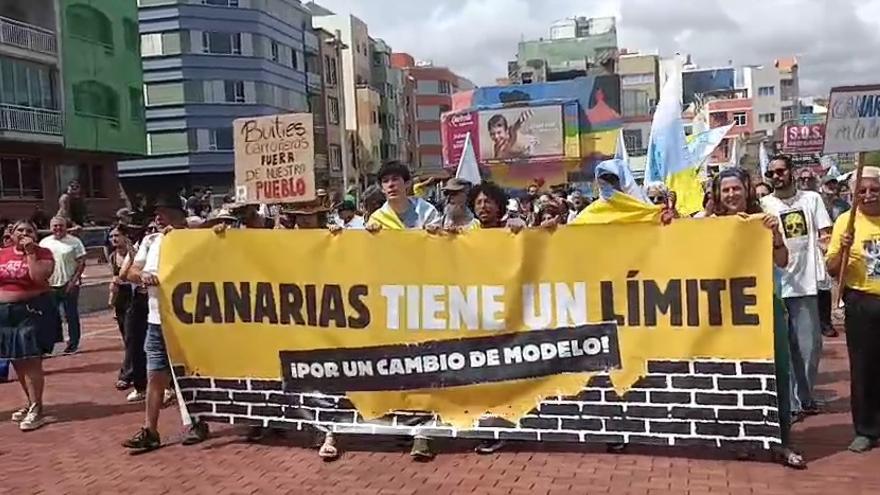The demonstration in the Canary Islands, which saw an 18,000-strong turnout, was predominantly held in Santa Cruz de Tenerife. The main demand was for a tourist moratorium law to halt the construction of new establishments, including ongoing projects, which could incur substantial financial penalties for authorities. Additionally, they called for a Residence Law and a “genuine” ecotax, among other topics of concern.
The CC-PP Government Pact is currently divided over the necessity to implement fiscal measures that would mitigate the effects of tourism on the local environment. The demonstrators were unified in their criticism, claiming that the Government of the Canary Islands has disregarded the “collective outcry” of 2024 and has failed to initiate a dialogue.
Among the projects deemed harmful are the urbanisation plans for the cradle of the soul at Puertito de Adeje, the Hotel de la Tejita, and the race circuit in Atogo (Granadilla), as well as potential future golf courses like the one at La Hoya (Adeje).

The province
“Demagogic Proposal”
Eustaquio Villalba from ATAN reiterated the need to protest against an “economic model” that has led the archipelago “to its current downfall.” “We represent the discontent of Canarian society” he stated, criticising the ecotax proposed by the president of the Cabildo de Tenerife, Rosa Dávila, labelling it a “demagogic proposal that does not deter” potential visitors, but rather aims to “collect” revenue. He expressed disappointment that authorities have not addressed the “crux of the issue,” which, in his view, involves restricting the number of visitors and available accommodation.
Daniel Duque, spokesperson for Save the Teachy, believed the mobilisation’s success stemmed from the indecision of certain politicians, particularly Rosa Dávila, with her proposed eco-initiatives. In his view, one of the significant adverse effects of the current economic situation on the islands is the housing crisis, stating, “it is a top priority and there are numerous challenges in securing both a home and even a room.” He further added the issue of job insecurity to the list.
“It’s not tourist phobia, it’s survival”
From a conservation standpoint, there is an urgent need to address the unchecked discharge of faecal and waste water into the sea at various locations across the archipelago. “We all acknowledge that we have reached the limit,” Duke asserted while echoing slogans from previous demonstrations: “The Canarian Coalition is a property company,” “this is not tourist phobia, it’s survival,” and “more nature, less concrete.”
Among the attendees was Wladimiro Rodríguez Brito, a former Geography Professor at the University of La Laguna (Ull) and former Minister for Environment and Agriculture in the Cabildo de Tenerife. “It is evident that the current model is unsustainable,” he explained, emphasising that the economy should not solely rely on tourism, as it suffers from “heavy external dependence.”
The nationalist advocated for the preservation of the tourism sector while also recognising the limitations of resources, particularly water. According to Rodríguez Brito, there should not be a conflict between water supplied to the primary sector and that needed for the tourism industry. He noted that for a farmer in Vilaflor, even a water supply of less than 500 litres constitutes 50% of his harvest income, while for a tourist, it accounts for just 3% or 4% of their overall expenditure.

















Blueprint for the Canary Islands. (Only a start)
FYI, I love the Canary Islands and the people and I am British.
1. All properties purchased henceforward must be occupied by the owner for a minimum of 10 months per year. (No sub-letting or holiday rental)
2. All properties currently owned as second homes by those not resident on the specific island in the archipelago, can only be sold to persons who will take up permanent residence for a minimum of 10 months per year.
3. Henceforward the Cabildos reserve the right to compulsory purchase homes where the owner is not resident for a minimum of 10 months per year and allocate said residence to the social housing pool.
4. A minimum wage is implemented for all those working in the hospitality and service sectors.
5. A sustainability tax is applied to all vacationers in the archipelago.
6. ‘All inclusive’ holidays are only available to families who have a child under the age of 12 years. This will deter Hen and Stag parties and encourage vacationers to spend more in local establishments.
7. Prohibit new licences for vacational lets such as Air B&B until the housing situation stabilises.